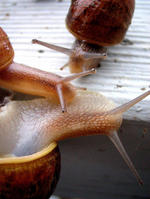Edition #1 Launch: Mollusca

Home at last.
The mollusca chain moved its quiet way through various tribes of words, came full circle and brought them back to me, where they have now found a snug home in the gorgeous anthology Mollusca. I feel privileged to have had these vibrant poems pass through my mailbox, and to lay them out together now, established voices beside newer works, all evidence of an enthusiasm for new directions in poetry.
It is with pleasure, then, that we will launch our lucent baby during this year's Overload Poetry Festival.
FRIDAY 11th AUGUST at 6.00 pm, at DANTE'S (the festival club), CNR GERTRUDE AND NAPIER STREETS, FITZROY, MELBOURNE
The Melbourne Arts Factory's Spoken Treats poetry choir will get us reved up, followed by much anticipated readings from some of the beloved poets themselves: Dan Disney, Luis González Serrano, Amelia Walker, Tana McCarthy, Andy Jackson, Fiona Stuart, Geoff Fox, Kate Middleton and more. Expect word games. Prizes. Belly-warming wine. Much salivating over the luscious publication of course, and many more forms of poetrylove.
The second edition of the chain letter will also be launched that night, so make sure youse and yours are there to take up your link.See the Overload website and fatten your calender with events from the aptly named festival. Many thanks to all who passed their poems along the mollusca chain, who showed so much enthusiasm for the process, and looked forward with me to the results.
Image by Zbigniew Twardowski for openphoto.net

